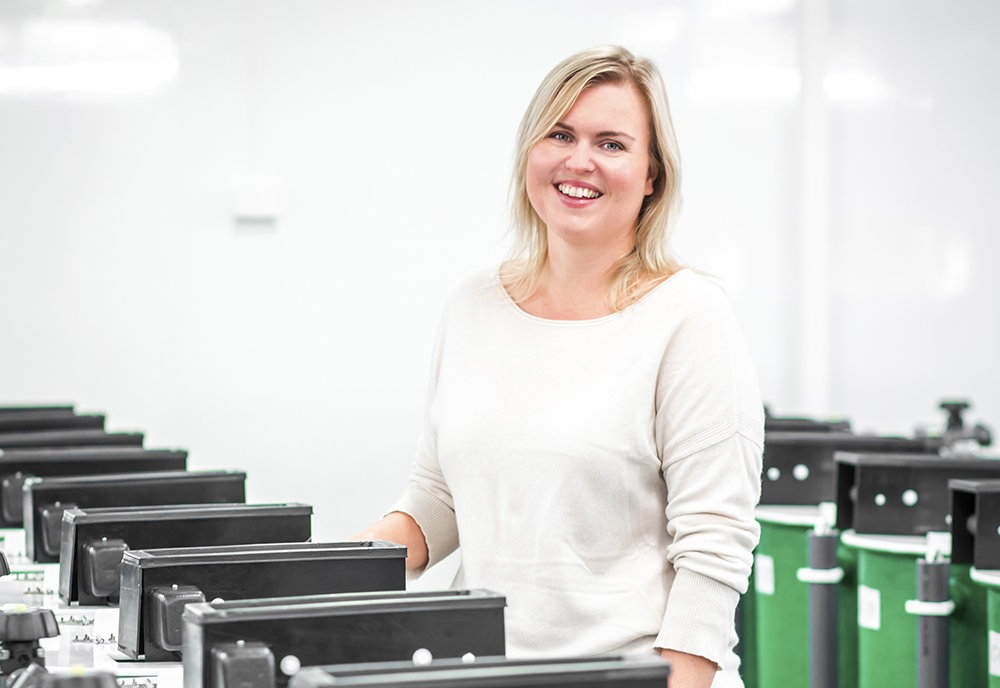
With the fish as your employer
Renate Kvingedal works as a scientist at the research station in Dirdal. She researches functional feeds and conducts tank experiments on smolt to be transferred to sea.
“The development within production methods brings new challenges for the fish. My objective is to see what I can contribute on the nutrition side under today’s methods. We create models for how stress impacts the fish and compose nutrition to make it more robust and resistant to strain and disease, and for it to recover as quickly as possible. I truly feel our job contributes to improving fish health and making the fish better prepared for coping with production methods.”
Why do you put the fish first in the work you do?
“The fish is my employer. You may put every kind of fantastic ingredient in the feed, but if the fish are still not thriving, it doesn’t help. My job is to make sure it receives the right nutrition formulation for it to perform to its maximum and become robust. Not simply to avoid diseases, but also to build strength to be able to recover. Simply for the fish to eat, and that it starts eating sooner after it’s been sick, is the core of welfare.“
… and how do you do it, specifically?
“As a researcher, I’m concerned with understanding the production situation. The pace of development is so rapid, people still walk the corridors here who were part of starting this in the 1980s. It’s a young industry with an amazing flexibility and will to test new things to move forward.
Incredibly exciting things are happening out there. My task is to see whether the fish require different nutrition components under different production methods, and whether the nutritional need is different when we alter its environment. I develop models and methods for us to be able to measure the impact of suboptimal conditions on the fish. We then develop knowledge concerning what to add to the feed to help the fish during smoltification or prepare large smolt who will move from 13 degrees and artificial lighting to sea transfer in spring.“
What would happen if you did not prioritize fish health and fish welfare in your work?
“To us, it’s perfectly natural to prioritize fish health. It’s the core of everything we do. Fish with good welfare eat more and absorb and use the energy. It then becomes more robust and flexible for coping with strain, which increases survival.
From research experiments we have conducted, we observe that fish that is given optimal feed handles non-medicinal lice treatment better, recovers quicker and grows substantially better than other fish. This says something about the salmon’s potential. Salmon is a fantastic source for proteins as well as profitability, and with optimal fish health and welfare you can utilize this to its maximum. Every year an average of ten percent of the salmon in the sea die. If we, with our research, can contribute to increase survival with a couple of percent, it’s a matter of great values. Turning as much fish as possible into food increases the industry’s sustainability.”
What are the benefits of prioritising fish health and welfare, and for whom?
“What’s good for the fish is good for the farmer. Good fish welfare is also sustainable. If you feed and take care of a fish that dies a month before slaughter anyway, you waste a lot of energy. The more being produced for food, the better.“
Why should Fish First be an important focus area for the whole of Cargill?
“I think this industry is incredible, and I’m lucky to be part of it. There’s innovation and driving force and a search for new, sustainable protein sources and production methods. We can’t sit back as feed suppliers. We must take part and find out how to improve the feed, which is a vital part of fish welfare.
I have worked a lot with fish welfare during the last few years, and to me it’s more important than anything else. Good fish welfare means increased production, a more robust fish, less disease and better survival, which is positive concerning sustainability. Good fish welfare makes all the other pieces fall into place. I’m sincerely glad that Cargill emphasizes this aspect.”